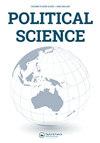政党为公投运动提供资金:以英国为例
IF 1.2
4区 社会学
Q3 POLITICAL SCIENCE
引用次数: 0
摘要
摘要关于公投运动的政治融资的文献主要集中在各个国家如何对其进行监管,但学术工作尚未从经验上探索这些监管和其他因素如何转化为政党的具体支出实践。本文试图为英国(UK)做这件事,英国拥有最古老、最广泛的公投政治融资制度之一,拥有《政党、选举和公投法》(PPERA)。在建立了基于政党行为和政治财政文献的几个假设之后,我们对PPERA关于公投竞选资金的规定进行了仔细的研究,并比较了英国政党在PPERA后的五次公投中的支出模式。调查结果表明,公投的竞争力,以及一个政党的财政资源和公投主题对该党的重要性,可能是他们参与公投活动的财政原因。更令人惊讶的是,我们的结果显示,PPERA规定的支出限制对政党支出几乎没有影响。政党很少接近规定的限额,但当他们确实达到限额时,他们可以通过捐款来规避,捐款不计入他们的支出上限。本文章由计算机程序翻译,如有差异,请以英文原文为准。
Referendum campaign financing by political parties: the case of the United Kingdom
ABSTRACT The literature on the political finance of referendum campaigns has focussed primarily on how these are regulated in individual countries, but scholarly work is yet to empirically explore how these regulations and other factors translate into concrete spending practices of political parties. This article attempts to do this for the United Kingdom (UK), which has one of the oldest and most extensive referendum political finance regimes, with the Political Parties, Elections and Referendums Act (PPERA). After formulating several hypotheses grounded in party behaviour and political finance literature, we offer a close examination of the PPERA’s regulations on referendum campaign finance and compare the expenditure patterns of UK political parties in five post-PPERA referendums. The findings suggest that the competitiveness of a referendum, as well as a party’s financial resources and the salience of the referendum topic for the party are possible explanations for their financial engagement in the referendum campaign. More surprisingly, our results show that expenditure limits imposed by the PPERA barely have an effect on party expenditure. Parties rarely come close to the limits imposed, but when they do bump up against the limit, they are able to circumvent this via donations, which do not count towards their spending cap.
求助全文
通过发布文献求助,成功后即可免费获取论文全文。
去求助
来源期刊

Political Science
POLITICAL SCIENCE-
CiteScore
0.90
自引率
0.00%
发文量
13
期刊介绍:
Political Science publishes high quality original scholarly works in the broad field of political science. Submission of articles with a regional focus on New Zealand and the Asia-Pacific is particularly encouraged, but content is not limited to this focus. Contributions are invited from across the political science discipline, including from the fields of international relations, comparative politics, political theory and public administration. Proposals for collections of articles on a common theme or debate to be published as special issues are welcome, as well as individual submissions.
 求助内容:
求助内容: 应助结果提醒方式:
应助结果提醒方式:


